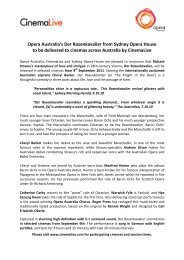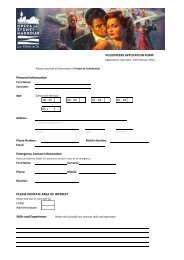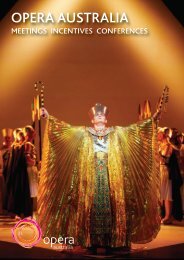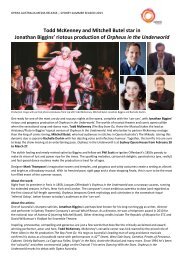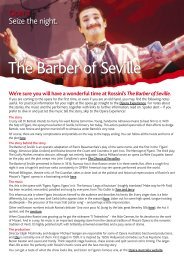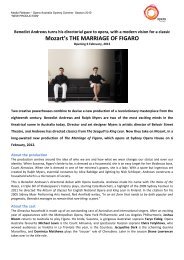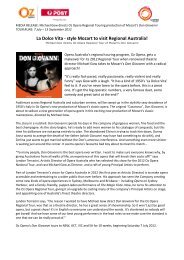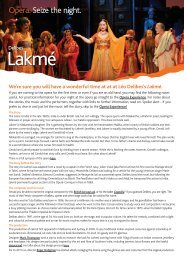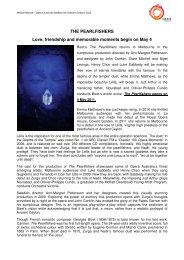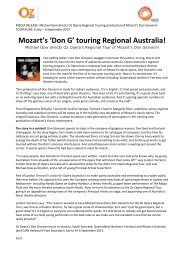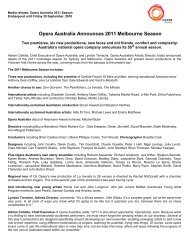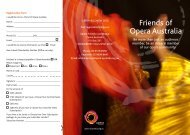2010 Annual Report Part 1 - Opera Australia
2010 Annual Report Part 1 - Opera Australia
2010 Annual Report Part 1 - Opera Australia
You also want an ePaper? Increase the reach of your titles
YUMPU automatically turns print PDFs into web optimized ePapers that Google loves.
CHIEF EXECUTIVE'S REPORT CONTINUED<br />
There is a third and more far reaching reason for OA’s declining sales,<br />
which I will elaborate on later. First, I am happy to report that even<br />
with this most challenging environment, we were able to minimise the<br />
impact on the Company’s financial reserves. <strong>Opera</strong> <strong>Australia</strong> has reported<br />
a $500,000 operating loss for year <strong>2010</strong>. (This includes the annual loss<br />
incurred on the AOBO, which also provides services to The <strong>Australia</strong>n Ballet’s<br />
Sydney seasons.) The <strong>Opera</strong> <strong>Australia</strong> Capital Fund has reported a modest<br />
surplus for the year, which means the depletion of the <strong>Opera</strong> <strong>Australia</strong><br />
Group’s reserves is $220,000, on total annual expenditures of $66 million.<br />
For this result, which could have been so much worse, I have my colleagues<br />
to thank. To the artists and artisans, and their representatives who<br />
understood the Company’s challenges and responded with moderation and<br />
practical wisdom, I am profoundly grateful. We also have the experience<br />
and ‘know how’ of my management colleagues to thank: when material<br />
savings had to be delivered, they knew what to do to maximise savings<br />
without compromising a program that was set and contracted three years<br />
ago. And my thanks are due to our Board of Directors, whose grasp of our<br />
business operations allowed management the discretion to make all the<br />
effective changes necessary to ameliorate our result.<br />
But, clearly, two operating deficits in succession make a compelling<br />
argument for change. And it is in response to this that I find myself both<br />
excited and optimistic about our national opera company’s future. When<br />
circumstances change, the first thing we must do is recognise that they have!<br />
Our response to our current challenges began nearly sixteen months ago<br />
when we recruited OA’s Artistic Director, Lyndon Terracini. It is my view<br />
that <strong>Opera</strong> <strong>Australia</strong> had refined its business and organisational model over<br />
the last decade about as far as it could go. Changed circumstances left our<br />
company and its artists exposed; and we all know it takes at least three<br />
years to set and fully realise plans for any new agenda in opera. We needed a<br />
creative response, indeed an artistic response, to our changed environment.<br />
Opposite above: Cheryl Barker as the<br />
Marschallin and ensemble<br />
Der Rosenkavalier<br />
Fundamental to our thinking about the future is the simple proposition<br />
that if we want to increase our audience and deepen our engagement<br />
with the community we have to change what we offer them.<br />
Opposite: Sigrid Thornton as Desirée and<br />
Anthony Warlow as Fredrik<br />
A Little Night Music<br />
OPERA AUSTRALIA ANNUAL REPORT <strong>2010</strong><br />
17



